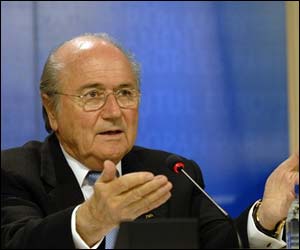By Andrew Warshaw
March 11 – FIFA President Sepp Blatter has defended the decision to permanently ditch goal-line technology by insisting it was the only way of preserving the way the game is played at all levels.
Despite a global outcry over the International FA Board’s (IFAB) decision not to allow further investigation into scientific ways to prove whether the ball has crossed the line, Blatter said the human element of the sport was sacrosanct and could not be tinkered with.
Blatter chaired the IFAB on Zurich on Saturday and, as yet, has not commented on arguably the most contentious recent decision taken by the rule-makers of world football.
But in his column for FIFA.com, he said the universality of the game was paramount.
“The game must be played in the same way no matter where you are in the world,” Blatter wrote.
“If you are coaching a group of teenagers in any small town around the world, they will be playing with the same rules as the professional players they see on TV.
“The simplicity and universality of the game of association football is one of the reasons for its success.
“Men, women, children, amateurs and professionals all play the same game all over the world.
”No matter which technology is applied, at the end of the day a decision will have to be taken by a human being.
“This being the case, why remove the responsibility from the referee to give it to someone else?
“It is often the case that, even after a slow-motion replay, ten different experts will have ten different opinions on what the decision should have been.
“Fans love to debate any given incident in a game.
“It is part of the human nature of our sport.”
“FIFA’s goal is to improve the quality of refereeing, making referees more professional and better prepared, and to assist referees as much as possible.
“This is also the reason why refereeing experiments [such as with additional referees or the role of the fourth official] will continue to be analysed, to see how referees can be supported.”
Despite his strong comments, Blatter misses one key point.
Referees themselves have cried out for assistance.
They far prefer goalline technology to two more pairs of eyes but Blatter is conveniently ignoring this.
As far as the financial aspect is concerned, Blatter says that the application of modern technologies would be too costly and therefore not applicable on a global level.
“Many matches, even at the highest level, are not even televised,” he said.
“For example, we have close to 900 preliminary matches for the FIFA World Cup, and the same rules need to be applied in all matches of the same competition.
“The rules need to be the same for all association football matches worldwide.”
 “The experiments conducted by companies on technology in football are also expensive.
“The experiments conducted by companies on technology in football are also expensive.
“The decision of the IFAB, after careful consideration and examination of studies conducted in recent years, to give a clear answer on technology in football is also positive in this regard as these companies will now not spend significant amounts of money on projects which in the end will not be implemented.”
Again he misses a vital point.
You have to start somewhere and where better than at the point where the stakes are highest?
Anyway, Blatter’s suggestion that football has to be universal is disingenuous to say the least.
Can you imagine having two extra officials behind each goal in a park pitch on a Saturday morning?
Who is going to pay for that?
It does not stop there.
“If the IFAB had approved goal-line technology, what would prevent the approval of technology for other aspects of the game?
“Every decision in every area of the pitch would soon be questioned,” continues Blatter.
“Association football is a dynamic game that cannot be stopped in order to review a decision.
“If play were to be stopped to take a decision, it would break up the rhythm of the game and possibly deny a team the opportunity to score a goal.
“It would also not make sense to stop play every two minutes to review a decision, as this would go against the natural dynamism of the game.”
For the third time, hogwash.
Instances of whether the ball has crossed the line hardly take place every few minutes.
They are few and far between, as everyone knows.
But crucially, they are also decisive - for players, for managers, for referees and for fans.
To suggest that the introduction of technology would serve as a dangerous precedent fools no-one.
The IFAB, after all, is the only body that can implement new regulations.
Countries cannot do so unilterally.
If the IFAB doesn’t want to bring in video replays all over the pitch, it simply says so.
End of story.
Contact the writer of this story at zib.l1745264594labto1745264594ofdlr1745264594owedi1745264594sni@w1745264594ahsra1745264594w.wer1745264594dna1745264594
Related stories
March 2010: Technology kicked into touch
March 2010: Fourth official and goal line technology on IFAB agenda
December 2009: Extra assistant referee experiment not working claim LMA
December 2009: Mihir Bose – Football must embrace modern technology
December 2009: Giveth With One Hand and Taketh with Another

